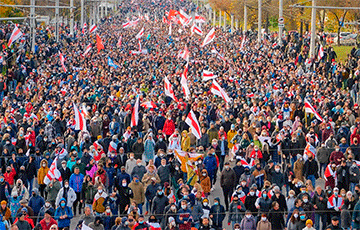‘Four Years Have Passed, But I Still Can't Forget That ‘Partisan March’
6- 26.10.2024, 8:38
- 7,392

A story about the revolution in Belarus, told by a driver from Minsk.
A truck driver from Minsk, Ales (name changed for the safety of relatives), now lives in Klaipeda, where he was forced to flee from persecution in February 2022. In his new place, he and his friends are trying to unite the diaspora in this city, organizing different events and actions together. The story that he agreed to share with Viasna HRC happened four years ago in Belarus.
“I noticed how my fingers turned blue from the zip ties that that had tied my hands with”
Ales took the events after the 2020 elections emotionally, participated in many protests and marches. It happened that he was caught in dispersals. Once he even got hit hard with a baton by a riot policeman, but his legs saved him all the time: he managed to escape, since he was a good runner. But one day he did get caught...
— It happened on October 18, 2020, on Lenin Street in Minsk, not far from the Crystal distillery. I was walking with my friends and my father. And there, near the long wall, we were pinned down — a minibus pulled up, and about 10-15 officers ran out. They grabbed me and started beating me, hitting me on all parts of my body — my head, my legs. They even tore my jacket.
Then they put zip ties on my wrists and took me in the “swallow” pose to the bus, where they threw me on the floor. My father also got caught in the crossfire. Then, for about two hours, the officers drove around the city on the bus, detaining people. At that time, there was not enough air in the cabin, and some people lost consciousness. Later, they transferred us all to a large paddy wagon. That's how people were grabbed that day and taken to the Maskouski District Department of Internal Affairs. At the exit of the paddy wagon, there were officers who beat those passing by them.
There, they herded everyone into the assembly hall, which was already jam-packed with protesters. The police photographed everyone and took fingerprints. I noticed how my fingers turned blue from the zip ties that they had tied my hands with. After the reports were drawn up, many were taken to the Zhodzina temporary detention facility, — the man says.
The national flag underfoot and the visiting judges
— In Zhodzina, the riot police threw a white-red-white flag underfoot, and those who stepped over it were hit by the officers. Then they led everyone through some passages and basements, shouted at us, and some were driven with truncheons. The most unpleasant and terrifying thing was the attitude of the temporary detention facility officers towards us. It was simply impossible to look at them, for this they used violence, almost all of them were wearing balaclavas. They swore filthily and looked at us as enemies and criminals.
I ended up in the cell with my father. There were a lot of people there, there wasn't enough space for everyone. There were only two bunk beds, and about 15 of us. No mattresses. The window in the cell was open all the time, it was very cold, the light was on, the anthem or pro-government songs were periodically played on the radio.
On the second day, a trial was held right in the temporary detention facility. Apparently, there weren't enough judges, so many were from the districts — the case of my friend from the neighboring cell was heard by a judge from the Krupki district, for example. There were also some from the Valozhyn district.
The protocol against Ales was drawn up under Part 1 of Article 24.23 of the Code of Administrative Offenses for violating the procedure for organizing and holding mass events. He was able to get acquainted with a copy of it only on October 30.
— The judge asked: “Do you plead guilty?” I said that I did not, that I did not agree with the protocol, that we did not shout anything, did not carry flags, we were just passing by.
Then he gave us time to prepare for the trial and postponed the hearing to October 30 in Dziarzhynsk. We went to court with my father. We told the secretary: we haven't read the materials, give us time to prepare. Fortunately, the judge, who for some reason was sitting there without a robe, sent the case, which was hastily cobbled together, back for revision. Like, wait for a new call.
Ales continued to go to the marches until they stopped, and even managed to forget about the protocol and the postponed trial. And only a year later law-enforcers came to his father’s place with a search. Then they searched Ales’s place of residence, asking relatives where he could be.
— I had already left Belarus though, because I felt that I would soon be imprisoned too. After all, at that time, a lot of trials were being held against participants in the 2020 protests. I was also worried about the administrative offence case, which ended in nothing back then. Also, they did not renew my labor contract at work. Then I urgently got a work visa and moved to Lithuania. Four years have passed since then, but I cannot forget that “Partisan March”.











